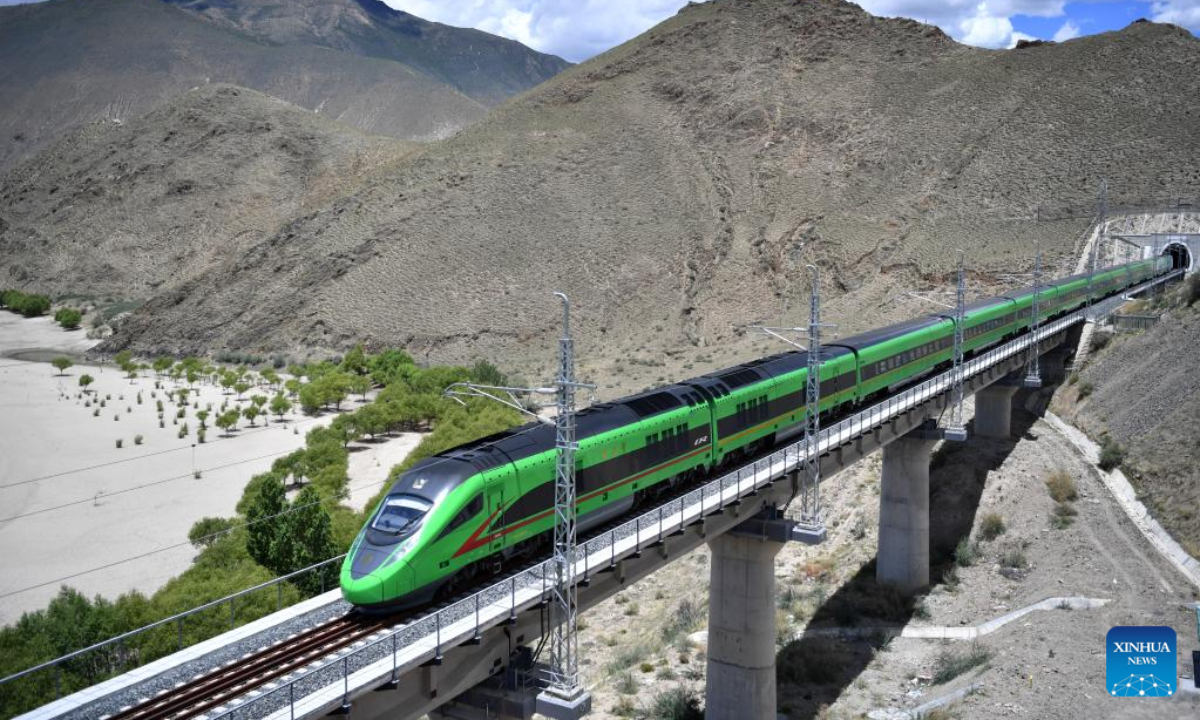
A Fuxing bullet train runs on the Lhasa-Nyingchi railway in Shannan, southwest China's Tibet Autonomous Region, June 22, 2022. Photo:Xinhua
Southwest China's Xizang (Tibet) Autonomous Region plans to complete the building of a total of 4,000 kilometers of railway lines as of 2025, according to the 14th Five-Year Plan (2021-25) and the medium- and long-term railway network plans released by the autonomous region authority recently.
According to the plans, the section between Ya'an in Southwest China's Sichuan Province and Nyingchi city in Xizang of the Sichuan-Tibet Railway, the section between Xigaze and Pelku Lake in Xizang of the Xinjiang-Tibet Railway, and the section from Bomi county to Ranwu Lake of the Yunnan-Tibet Railway will be operating by 2025.
Electrification of the section from Golmud city in Northwest China's Qinghai Province and Lhasa city in Xizang of the Qinghai-Tibet Railway will be completed.
The double-track reconstruction of the section between Pelku Lake and Hotan in Xinjiang Uygur Autonomous Region on the Xinjiang-Tibet Railway and the Lhasa-Nyingchi Railway is expected to be completed.
Construction of the railway in Gyirong county, Xigaze, is to start by 2025.
According to the plan, the unique tourism resources in Xizang are expected to attract more tourists from China and abroad with railway passenger trips in the autonomous region anticipated to reach 5.62 million by 2025 and about 9.68 million by 2035.
In terms of cargo, it is expected that the quantity of goods to be delivered will reach 1.09 million tons and the freight to arrive by rail will reach 10.29 million tons by 2025. As of 2035, the delivery of goods will reach 1.79 million tons and the quantity of freight arrivals will reach 13.04 million tons.
The plan also shows that by 2035, the total railway network in Xizang will reach 5,000 kilometers or more, including 1,000 kilometers of double-track railway lines.
With Lhasa as the center, the network will cover all prefecture- and city-level administrative regions in the area and provide convenient access to Xinjiang, Qinghai, Sichuan, Yunnan and other neighboring provinces as well as major land ports along the border.
Xizang also plans to build an international railway corridor to South Asia to open the international railway channel between China and South Asian countries.
Restricted by the natural environment and engineering technology, railway construction in Xizang started late with only three railway lines in operation at present.
Reputed as "the sky road," The Qinghai-Tibet Railway, put in operation in July 2006, ended the history of Xizang without trains. The opening of the Lhasa-Xigaze Railway in 2014 and Lhasa-Nyingchi Railway in 2021 formed the main framework of Xizang's railway network, together with the Golmud-Lhasa section of the Qinghai-Tibet Railway.
As of the end of 2021, Xizang had 1,359 kilometers of railway lines in operation.
In addition to railway construction, Xizang has also made plans for general aviation development in the near future. In the aviation development plan for 2021-2035 released on Thursday, the authorities have proposed to basically realize that each county-level region will have one or more general aviation airports by 2035.
According to the plan, by 2025, Xizang plans to vigorously promote the construction of general aviation airports and supporting security facilities, aiming to build 14 new general aviation airports.
The long-term goal of the Xizang region in 2035 is to achieve leapfrog development in general aviation. In 2035, Xizang will have 59 general aviation airports, basically realizing that each county has one or more general aviation airports, and aviation services will cover more than 95 percent of the region's population, according to the latest announced plan.
Global Times


